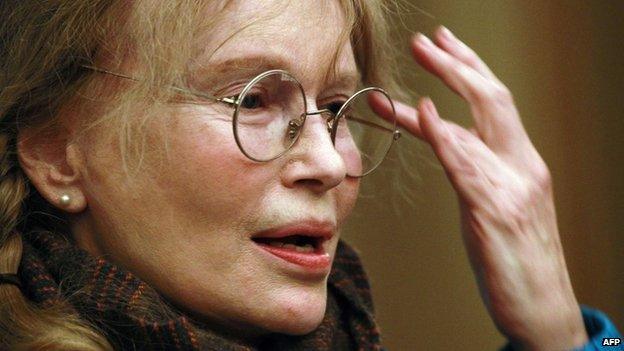Woody Allen accused of sex abuse by adopted daughter
- Published

Filmmaker Woody Allen has always rejected allegations of molestation
The adopted daughter of Woody Allen has renewed claims the filmmaker "sexually abused" her as a child in 1992.
In an open letter, Dylan Farrow accuses Mr Allen of molesting her in a "dim, closet-like attic" at the age of seven.
Ms Farrow, now 28, also criticises Hollywood's continued celebration of "a predator [who] brought chaos into our home".
Mr Allen was investigated over the abuse allegations at the time of the incident, but was not charged.
A panel of psychologists, appointed by US prosecutors and the police, concluded that Dylan had not been molested.
The case caused controversy when a prosecutor later said there had been "probable cause" to charge Mr Allen, but he had chosen not to, in order to protect the child.
The movie director has always maintained his innocence. He has previously accused Dylan's mother, Mia Farrow, of fabricating the claims after their highly publicised break-up in 1992.
'Refuse to fall apart'
Dylan Farrow opens her letter, published on the New York Times website,, external by asking: "What's your favourite Woody Allen movie? Before you answer, you should know: when I was seven years old, Woody Allen took me by the hand and led me into a dim, closet-like attic on the second floor of our house.
"He told me to lay on my stomach and play with my brother's electric train set. Then he sexually abused me".

Mia Farrow was in a relationship with Woody Allen for 12 years
Ms Farrow, who now lives in Florida under a different name, said she developed an eating disorder and was self-harming following the incident.
"That he got away with what he did to me haunted me as I grew up," she writes.
Of the panel who dismissed her claims back in 1992, Ms Farrow says: "Sexual abuse claims against the powerful stall more easily. There were experts willing to attack my credibility."
She said she decided to break her silence after two decades, when Woody Allen's latest film, Blue Jasmine, was nominated for an Oscar last week.
Hollywood 'torment'
Ms Farrow explained that Hollywood had made her "torment worse" by turning "a blind eye" to her story.
"Each time I saw my abuser's face - on a poster, on a t-shirt, on television - I could only hide my panic until I found a place to be alone and fall apart. But this time, I refuse to fall apart," she says.
"Woody Allen is a living testament to the way our society fails the survivors of sexual assault and abuse."
Ms Farrow also takes aim against actors who have appeared in Mr Allen's movies.
"What if it had been your child, Cate Blanchett? You knew me when I was a little girl, Diane Keaton. Have you forgotten me?"
Last month, Diane Keaton accepted a lifetime achievement award for Woody Allen, who has a reputation for being notoriously reclusive.
Her move sparked a major debate on social networks. It drew heavy criticism from Mr Allen's biological son with Mia Farrow, Ronan, who tweeted:
"Missed the Woody Allen tribute - did they put the part where a woman publicly confirmed he molested her at age 7 before or after Annie Hall?"

Ronan Farrow has been estranged from his father for many years
Ms Farrow's letter has already sent ripples through Hollywood.
Blue Jasmine star Cate Blanchett responded to the piece saying: "It's obviously been a long and painful situation for the family and I hope they find some resolution and peace."
It also drew strong responses from US media, including Wall Street Journal columnist Tom Gara who described the letter, external as the "end of Woody Allen".
Meanwhile, hosts at the Writers Guild Awards ceremony included references to the scandal in their puns on Saturday night.
Actress Mia Farrow became romantically involved with Woody Allen in the early 1980s. The pair, who never married and kept separate homes, jointly adopted Dylan and her brother, Moses.
The couple split in 1992 amid revelations that Mr Allen had an affair with another adopted daughter of Mia Farrow, Soon-Yi.
The molestation allegations surfaced shortly after the breakup.
At the time, Woody Allen released a public statement, calling the claims "an unconscionable and gruesomely damaging manipulation of innocent children for vindictive and self-serving motives".
- Published15 September 2013
- Published13 January 2014
- Published3 October 2013